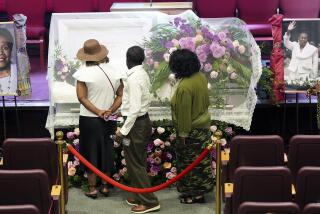Admirers Express a Personal Loss
- Share via
ATLANTA — Claudia Robertson took her grandson to the King Center on Tuesday afternoon to help him understand the sweeping historical significance of the civil rights movement -- and the specific contributions of Coretta Scott King.
But a few hours earlier, she and her husband made a more intimate trip to the gravesite of King’s iconic husband, bearing flowers as if they were cousins at a country funeral.
“We grew up as part of the civil rights generation,” said Richardson, 65, “and the loss of Coretta Scott King feels like the loss of a family member.”
As news of King’s death spread through Atlanta on Tuesday morning, hundreds of other people came in a slow, steady trickle to pay tribute to her memory at the civil rights center she established after the 1968 assassination of her husband, Martin Luther King Jr. They left balloons and grocery store bouquets for Coretta Scott King at the edge of the reflecting pool that surrounds her husband’s grave -- a spot they found perfectly fitting.
“I feel like it is the other half of Martin Luther King that is gone,” said Diskin Bailey, a 40-year-old Navy veteran.
Coretta Scott King’s management of the King legacy had its critics over the years, and her death came amid an ugly public dispute among her children over whether the financially struggling King Center should be sold to the federal government.
But most visitors Tuesday came only to praise her. They spoke proudly of her efforts to carry on her husband’s message of nonviolence and her successful drive to create a national holiday in his honor. They also praised the King Center, a popular tourist attraction that has helped local leaders promote Atlanta as the exemplar of a Deep South that is in thrall of -- rather than ashamed of -- its civil rights past.
Strangers spoke of the personal debt they owed the elegant woman they knew as the first lady of the civil rights movement. Army Sgt. Jamilah Lee, 32, arrived in the late afternoon in her camouflage uniform, bearing white roses and pink carnations.
“I almost feel as though I had to come -- not just because of what the King family has done for black people, but because of what Mrs. King did for women,” Lee said. “If it wasn’t for her, I wouldn’t be a black woman -- a sergeant -- in the Army.”
She crossed Auburn Avenue -- a storied strip of black-owned businesses that has seen better days -- and joined the crowd milling by the King mausoleum. Families held hands and prayed. A group of children in an after-school program sang “We Shall Overcome.” A grandmother sternly shushed her misbehaving grandchildren as she posed them for a picture.
Next door, visitors listened to Martin Luther King Jr.’s historic sermons while sitting on the austere wooden pews of the old Ebenezer Baptist Church where he once preached. The King Center gift store, meanwhile, did a brisk business in tote bags and T-shirts bearing the likeness of the famous couple, with Coretta Scott King posed piously, her hands clasped in prayer.
The crowd was largely, but not exclusively, black. Renee Sassaman heard the news and decided to give her four children a break from home schooling in the largely white suburb of Alpharetta.
“I wanted the kids to have a chance to experience this history and learn more about Dr. King and Mrs. King,” said Sassaman, 39, who is white. “They’re angered when I tell them the stories about segregation.... They don’t understand it.”
Phreddie Huber and Laura Tanner, a white lesbian couple, said they admired King for her stance on race matters, but also on her more recent proclamations in favor of gay rights. Huber said she was impressed when King came out publicly against Georgia’s anti-gay marriage law a few years ago. “I hope [her death] will be a catalyst for healing,” Huber, 43, said.
Claudia Robertson’s husband, Gerald, was more skeptical. The retired truck driver was worried that the civil rights movement was not replenishing its great giants as they died.
Robertson is a jazz buff, and he put the problem in jazz terms.
“I don’t know anybody in the civil rights movement today who’s like a Yardbird or a Coltrane,” he said.
More to Read
Sign up for Essential California
The most important California stories and recommendations in your inbox every morning.
You may occasionally receive promotional content from the Los Angeles Times.










